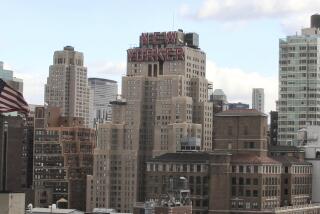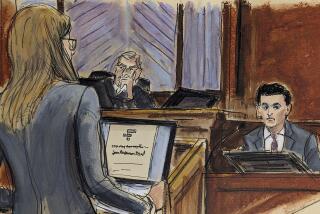Global Manhunts : New Muscle in Long Arm of the Law
- Share via
NEWARK, N.J. — Former state Sen. David J. Friedland might have been just another corrupt New Jersey politician under investigation by federal authorities here, except for one thing: Friedland was on the lam.
To keep out of prison after his conviction for accepting kickbacks, Friedland had faked his death in 1985 while scuba diving in the Bahamas, and then--flush with what officials believe was at least $1.5 million in illegally gotten cash--took off for London to begin an odyssey that was to take him to elegant hotels and remote hideaways around the world.
For more than two years federal investigators tried to track him down, working from dingy headquarters in the center of run-down Newark to follow up on more than 100 tips that placed the ex-senator from Jersey City as sunning on Spain’s Costa del Sol, on safari in Africa, skiing in the Alps and scuba diving somewhere in Southeast Asia.
Eluded Pursuers
Twice--in Paris and in Nairobi--Friedland was located but both times he shook his pursuers. The man who was to become the government’s most wanted fugitive left a trail increasingly hard for investigators to follow.
Not until late last month did the government catch up with Friedland--after receiving a come-and-get-him phone call from national police in the Republic of the Maldives, a chain of coral atolls scattered in the southern Indian Ocean.
U.S. officials are reluctant to provide specific details of their investigation, wary of compromising foreign sources. But available information about the case helps to illustrate the government’s limited capacity to track a criminal around the globe.
In a world with no international police force and virtually effortless international travel, U.S. investigators must rely on luck and the help of other governments to find such fugitives. Constrained by costs and diplomatic sensibilities, they can rarely go abroad to stalk their targets in foreign capitals like the fictional detectives in television adventures.
Search by Proxy
Rather, they must search by proxy, collecting tips by telephone and sending Telex messages to other countries’ officers to be on the lookout for those they seek. The method is tangled by red-tape and fraught with bureaucratic lapses that can well allow a resourceful fugitive with abundant funds to remain at large for years.
But eventually, law enforcement officers insist, the network of information often catches up with them. It was a U.S. overseas bulletin, forwarded by the Interpol international law enforcement clearinghouse, that helped Maldivian officials identify Friedland, who was using the name Richard Smith Harley and working as a scuba instructor with a false Costa Rican passport.
Through law enforcement cooperation, “lawbreakers have an increasingly difficult time avoiding the reach of the law,” said Stanley E. Morris, director of the U.S. Marshal’s Service. “If you can’t hide in the Maldives,” he said, “you can’t hide anywhere.”
Friedland, 50, is back in a U.S. jail now in downtown Manhattan, serving a seven-year sentence first imposed in 1980 and facing further charges that carry a maximum penalty of 150 more years in prison.
Informed sources say that U.S. officers’ 27-hour flight overseas to retrieve the captured suspect was one of only a few times U.S. agents left the country in pursuit of him.
Though U.S. officials based abroad had done some sleuthing, most of the work was done in the dingy office in Newark and in government agencies there where officials had come to know Friedland well.
The district offices of the Labor Department, the U.S. Attorney and the FBI had been involved in the initial investigation that led to Friedland’s 1980 conviction on charges of receiving kickbacks relating to a Teamsters pension fund. The office of the U.S. Marshal began leading the hunt for Friedland soon after he disappeared.
To those investigators--whose chances of finding Friedland from afar depended on a thorough knowledge of his habits--the luxurious setting in which he was finally caught and the testimony of his lawyer at his Camden, N.J., arraignment this week that prison was “breaking” his client, were no surprise.
It was Friedland’s fear of the hard life in prison that caused him to flee in the first place, they say; it was his high living that provided clues about his travels; in the end, it was that style of life that helped the hit-and-miss apprehension system ensnare him.
Committed Consumer
Long before his disappearance, Friedland had been a committed consumer--some say a glutton--of the finer things. He ate at the best restaurants and stayed at the best hotels, traveled around the world and went skiing and scuba diving wherever the action was best.
Friedland managed to maintain such a life style even after he was convicted, as a first-term state senator, on the 1980 charge, for which he was sentenced to seven years in jail.
Because he agreed to cooperate with the U.S. attorney in Newark in a political corruption investigation, Friedland’s seven-year sentence was postponed. To further accommodate him, the U.S. attorney granted his request to leave New Jersey to live in the Bahamas.
But in the summer of 1985, Friedland’s charmed life began to collapse around him. His father died in June; authorities discovered that he was paying more kickbacks to Teamster trustees in return for help on investments that reportedly made him and an associate $3 million; it seemed likely that the long-delayed prison sentence could be postponed no longer.
On Labor Day, 1985, in a carefully planned escape, Friedland went diving off Grand Bahama Island with his friend Jack Wynn and did not come up.
In interviews after his capture, Friedland told reporters that he took with him a waterproof bag packed with fake passports and cash, swam to a second boat that took him to shore and donned a fake moustache for a flight to London. He was so nervous that his moustache “was dripping half off,” Friedland said.
The Newark-based officials who knew Friedland well were immediately suspicious of his disappearance. But any doubts about his fate were resolved, typically, by the flamboyant legislator himself, when he called his lawyer and left a message on his answering machine.
The hunt was on. At the beginning it was a full-time job for a dozen federal officers in Newark alone. U.S. authorities already had issued an all-points bulletin for Friedland through Interpol, the Paris-based international organization that helps national police agencies share information. Eventually, they upgraded that alert and distributed to 146 Interpol countries a top-priority wanted notice.
The notice included Friedland’s photograph and fingerprints, listed his known aliases and reported that he was believed to be using a false Greek passport in the name of Ionnis Stogios.
But the system for circulating such information can be slow-moving and inefficient. There are about 900 such Interpol bulletins distributed each year. And in Friedland’s case, the top-priority notice was not passed along until early 1986, Interpol officials acknowledge.
Traveled Freely
Even afterward, Friedland was able to travel freely on the Stogios passport through Southeast Asia, investigators believe.
Part of the problem may have been that the case of a crooked American politician was seen as a low priority, investigators speculate privately. Additionally, they say, many nations’ customs systems are not computerized, making quick identification of a suspect difficult. And when all that U.S. authorities could supply was a vague tip about Friedland’s location, foreign police departments were often reluctant to check it out.
“We always ran into that same problem,” said Raymond Wren, special agent in charge of the Labor Department’s office of labor racketeering in Newark. “But I can imagine (what would happen) if they requested the authorities here to find someone, with very little to go on other than a photograph. There are very few people who would go out and do it.”
Despite the disappointments, the first few months of the hunt for Friedland were heady days. Information was apparently plentiful.
There were credit card records that helped officers trace Friedland until he switched to cash. There were informants who knew where Friedland had traveled before. There were others he telephoned, sometimes hinting at where he was. There were “technical means,” including at least one wiretap, one source said.
And equally important, there was investigators’ knowledge of his life style.
While he was on the run, said one U.S. marshal close to the investigation, Friedland “lived the life of the rich and famous . . . . It was first-class, top-shelf all the way.”
At four-star hotels and other locations in London, Paris, Venice and Rome, and at a resort in Spain’s Costa del Sol, investigators eventually found people who remembered the high-living tourist, according to sources close to the investigation. Nevertheless, “it was frustrating,” Wren said. “We always seemed to be a few steps behind him.”
Twice in those first few months, investigators were just a step away.
In December, 1985--no one will say how--American officials learned that Friedland was in Paris, where he had stayed for at least a month at the exclusive George V hotel. Rooms at the hotel cost nearly $300 a night and an original Renoir hangs there. The Americans in Newark requested help through Interpol but with the top-priority notice not yet received, French authorities were slow to respond.
Friedland checked out the day before they arrived.
A month or so later, a source said, the trail resumed in East Africa, marked by a string of credit card bills. There, Friedland, on a deluxe safari run by the exclusive Abercrombie & Kent firm, lived “with the lions waking within 15 feet of my tent,” he told CBS in a recent interview. “Elephants in my camp . . . Samburu warriors . . . glamorous, glorious life this was, tenting out.”
Friedland was thinking of settling in Kenya to open a safari business of his own, a long-time acquaintance said. Meanwhile he was staying in Nairobi’s Norfolk Hotel, a gathering place for wealthy expatriates.
A Step Ahead
Alerted by Newark authorities through Interpol, Kenyan police showed up at the hotel to arrest him. But while they waited in the lobby for him to return from a drive, he checked back by pho1852121190visitors. Again, he disappeared, leaving expensive clothes and camera equipment behind in his room.
When Friedland wasn’t back in custody by the spring of 1986, Assistant U.S. Atty. Jay Fahy had to pay off some dinner bets. Other officials grumbled about the lack of cooperation abroad. With fewer tips, the hunt for Friedland became a part-time job and frustration grew.
Friedland virtually taunted those who were looking for him. In late March, 1986, he invited a New York Daily News reporter to spend a week with him at a rented chalet in the French Alps nea1914717032hide-out, reporter David Hardy wrote, with ideal escape routes: Friedland could ski into Switzerland if the police came too close, and Italy was just a gondola ride away.
Sensitive about pressuring a journalist for information, investigators did not interrogate the reporter. And anyway, Friedland already had made plans to move on. As the snow in the Alps mel1952801824underwater photographer he had met in the Bahamas, packed up and headed for a tropical island in the southern Indian Ocean.
But though investigators were to be stymied for another 18 months, as reported sightings in Sri Lanka, Hong Kong and Singapore all failed to pan out, their luck was finally to change.
Friedland and Golightly settled on the tiny Maldives island of Bandos, a tropical paradise of coconut palms and azure water. There they ran a scuba diving business, teaching tourists to explore some of the world’s best diving waters, and Friedland traveled in and out of the country without incident.
Characteristically, he lived flamboyantly, delighting tourists by feeding sharks from his hand--the stunt was photographed for a picture postcard--and later appearing on Maldivian television. But this time, he attracted too much attention and stayed too long.
Word From Tipster
A tipster--some say a business associate of Friedland--suggested that Maldivian police check Friedland’s passport for irregularities, the police told U.S. marshals. They found that while that passport showed seven sets of entries and exits to the Maldives, there was no indication where he had gone, suggesting that he was using another passport.
For more than two days they sifted through Interpol bulletins, finding the one on Friedland on Dec. 21.
Since his return Friedland has told interviewers that he is glad to be back in the United States and eager to end the affair. But investigators say that he did all he could to avoid returning.
First he asked the Maldivians for sanctuary on grounds that he had become a Muslim and past crimes should be excused. Then he asked that a Telex be sent to the Libyan embassy requesting asylum. The Maldivians laughed off the requests.
Some officials say they are surprised that it took two years to catch Friedland. Most, however, acknowledge that, given the abundant pitfalls of international fugitive searches, it might have taken years longer.
For their eventual success, they agree, they have law enforcement cooperation--and Friedland himself--to thank. “I can only tell you that David Friedland was captured because he was really too successful,” said Arthur Borinksy, U.S. marshal for New Jersey. “If he had . . . become low profile, he might still be at large.”
Douglas Jehl, who is based in Washington, was in Newark recently to report this story.
More to Read
Sign up for Essential California
The most important California stories and recommendations in your inbox every morning.
You may occasionally receive promotional content from the Los Angeles Times.













